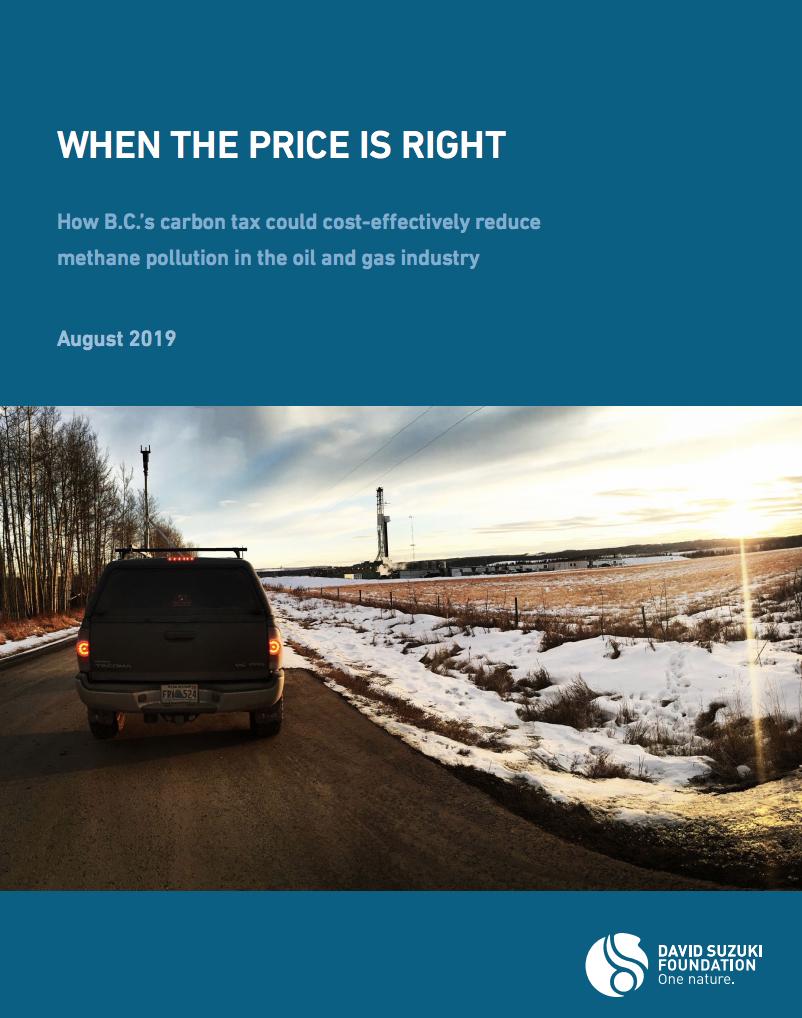Published by the David Suzuki Foundation with support from Metcalf, When the Price is Right: How B.C.’s carbon tax could cost-effectively reduce methane pollution in the oil and gas industry focuses on evaluating how British Columbia’s carbon tax might be applied to methane emissions from oil and gas to drive emissions reductions.
Authors Levi Marks and Tom L. Green acknowledge that their work builds on recent research conducted by St. Francis Xavier University and the David Suzuki Foundation, which found that methane emissions from the oil and gas industry are a much bigger problem than previously reported. This discovery combined with the fact that methane is currently responsible for 20 per cent of already observed changes to Earth’s climate, lends urgency to their findings and recommendations.
They state that reducing methane emissions “offers large, cost-effective climate mitigation benefits over the short term” because unlike carbon dioxide, methane is a short-lived climate pollutant that disappears from the atmosphere more quickly.
Methane is generated from a number of sources but When the Price is Right focuses exclusively on those from the oil and gas sector. Marks and Green posit that “broadening the carbon tax to cover methane emissions would complement recent regulations focused on reducing methane emissions from the upstream oil and gas industry” while supporting “the CleanBC blueprint for reducing the province’s GHG emissions”. Both the B.C. and the federal government have already committed to reducing methane emissions in the oil and gas sector by 40 to 45 per cent by 2025. Additionally, in 2017, the B.C. government committed to expanding the carbon tax to include methane emissions. Therefore, the authors contend that “B.C. has an opportunity to demonstrate its climate leadership if it chooses to take on this innovative approach to turning down the dial on methane pollution.”
The report models two approaches to applying B.C.’s carbon tax to methane emissions and the “results show that these emissions reductions can be achieved more cost-effectively than in other sectors of the economy and without imposing a substantial competitive disadvantage on the province’s oil and gas industry.”
The report’s recommendations include:
- Forming a technical committee or scientific review panel to provide more detailed advice on how B.C.’s carbon tax can be implemented to control methane emissions.
- Allocating funding to improve the accuracy of oil and gas provincial inventory data and to independent direct monitoring of emissions using vehicle-based, aerial, and/or emerging measurement technologies.
- Applying B.C.’s carbon tax to methane emissions using an inventory-based approach 4. Retaining regulations as an essential methane mitigation tool to work alongside the carbon tax.
- Phasing the application of the tax to the sector’s methane emissions over three to six years, in increments of $5 to $10/tCO2 e per year and set implementation date in B.C. budget 2020 and fiscal plan.
- Tying the conversion from methane emissions to tCO2 e using the most recent and more accurate IPCC estimates for the warming potential of methane.


